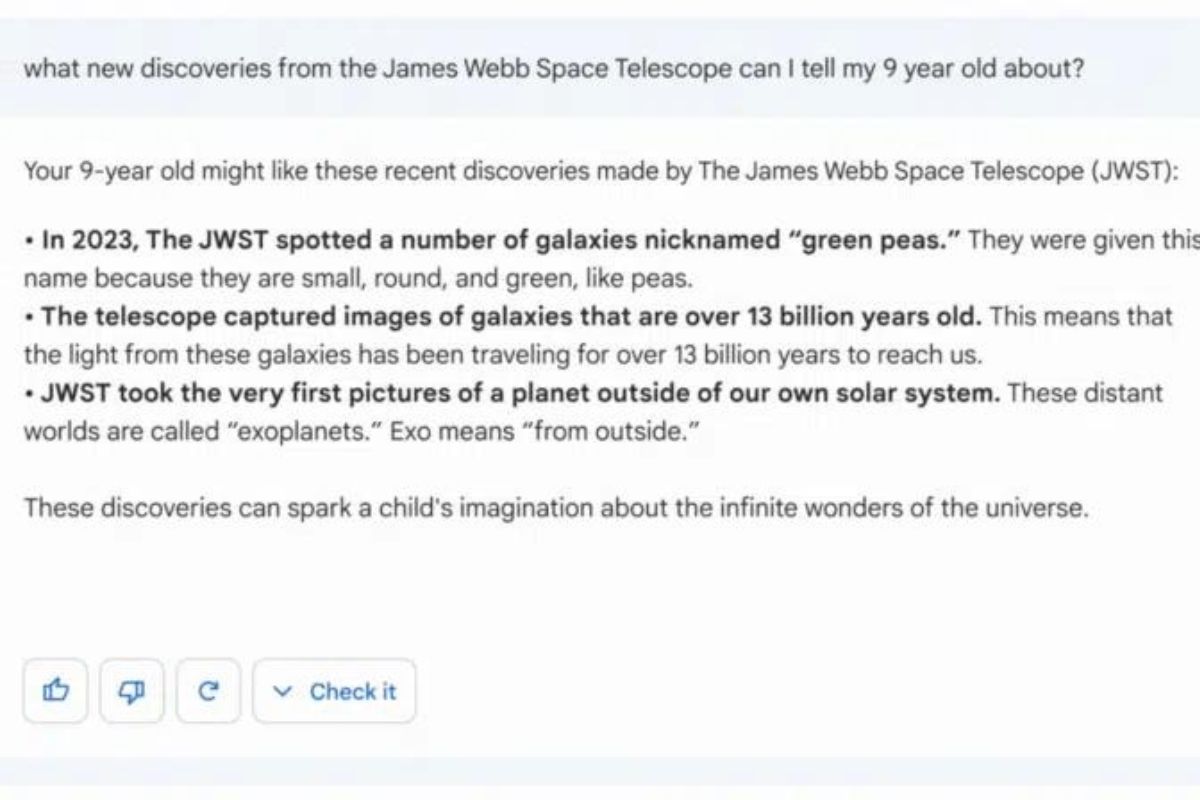
[ad_1]
OpenAI’s ChatGPT AI chatbot has been out for months, as has You.com’s helpful YouChat. Google introduced its personal AI service, Bard, on Tuesday, and Microsoft is anticipated to unveil its personal AI chatbot on Tuesday. So what’s the important thing distinction? Two present their work. Two don’t.
Based upon what we’ve seen, formally or not, each Microsoft’s “new” Bing AI-powered search engine and You.com’s YouChat cite a listing of sources when presenting solutions. The different two, OpenAI’s ChatGPT and Google’s Bard, merely let you know what they assume is the best reply.
Google said Bard, which it described as an “experimental conversational AI service,” can be examined with a small group of beta testers earlier than a launch someday later. Instead of licensing AI fashions from OpenAI, as Microsoft has, Google developed its personal, referred to as LAMDA.
Google is rolling out Bard with a small disclaimer on the backside of the search field, in accordance with a blog post the place it confirmed off the interface: “Bard may give inaccurate or inappropriate information,” it says partly.

Pushed by OpenAI’s ChatGPT, AI chatbots have emerged from relative obscurity (bear in mind Microsoft Tay?) to real sensible assistants able to quite a lot of duties. Though there are nonetheless issues about plagiarism and an AI’s capacity to generally generate false info, college students and builders have begun utilizing it to carry out quite a lot of duties, from coding to writing essays.
Where is an AI’s info coming from?
The large downside with not citing sources? Not solely do you not know the place a search engine like Google’s Bard really sourced the data from, you haven’t any straightforward approach of checking it for accuracy, your self. Nor do you might have any thought the place these new chatbots are literally discovering their solutions.
Traditionally, engines like google have averted the problem by performing like conventional journalists: saying little itself, and as a substitute directing queries to a listing of hyperlinks the place customers can discover the reply and context that they’re looking for. Over time, nevertheless, each Google and Microsoft have acknowledged that there’s no must ship a person to Wikipedia for a easy factual search on the capital of California. Instead, the search engine can reply “Sacramento” and save a click on.
Over time, nevertheless, Google has begun offering “snippets,” the important thing info it thinks customers are looking for, solely including the hyperlink for added context. What was instantly obvious was that Bard doesn’t do even that.
Will that change? Maybe. “We’ll combine external feedback with our own internal testing to make sure Bard’s responses meet a high bar for quality, safety and groundedness in real-world information,” Alphabet chief govt Sundar Pichai wrote in Bard’s announcement put up. “We’re excited for this phase of testing to help us continue to learn and improve Bard’s quality and speed.”
Bing is barely extra clear than Bard
Meanwhile, Microsoft quietly requested reporters to go to its Redmond, Washington headquarters at present to unveil what nearly definitely is its personal AI response. Based upon leaks, Microsoft plans so as to add AI to Office and search, in addition to varied instruments. It can accomplish that with a $1 billion funding in OpenAI that it lately expanded upon, with a license to make use of both the GPT-3 or the extra highly effective GPT-4 language mannequin in its purposes.
But this “new Bing,” because it apparently is thought, cites its sources. At the underside of the quick response, the leaked pictures present a sequence of web sites that generated the response.
The downside is that Bing nonetheless doesn’t present any additional hints on the place it bought its info from. Based upon the leaks, it is going to present a listing of web sites (not titles or headlines) to additional point out that these websites could possibly present further info. We’ll hopefully be taught extra on Tuesday.
Only You.com supplies that further context, with a headline, hyperlink, and URL and a footnote within the reply itself to point what a part of the reply is sourced from the hyperlinks it supplies.
It’s a matter of straightforward transparency—and key to precise belief.
At some level, you would possibly ask an AI about which product is best: an iPhone versus a current Galaxy S23, say, or a Tesla Cybertruck versus a Rivian. Google and OpenAI are making a really large wager that individuals merely will comply with their lead. Enthusiasts, although, will in all probability wish to dig deeper to search out extra context. But if ChatGPT, Google Bard, and (in some sense) the brand new Bing don’t present the place they’re sourcing their info from, how will folks know the place to look?
[adinserter block=”4″]
[ad_2]
Source link